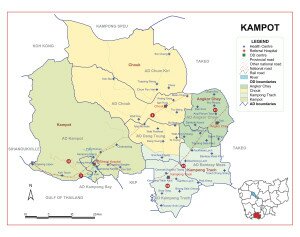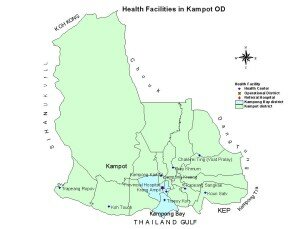Every Mother and Every Child Counts – GIZ and partners join the road to making motherhood safer for Cambodians

24 February 2013
Kampot Province, Cambodia – Despite the progress achieved during the last decade, Cambodia’s health indicators are still among the worst in Southeast Asia. Huge inequities exist between rural and urban population and between the wealthiest and the poorest quintiles. High risk deliveries contribute to high maternal and new-born morbidity and mortality. Reasons lie in inadequate antenatal care and unqualified attendance during emergency obstetric and new-born care, especially at the health centre level.
“The challenges in Cambodia are multi-faceted: high-risk pregnancies are not always observed, or not treated correctly; health professionals lack clinical skills; and health facilities are not well equipped to deal with emergencies,” Klaus Hornetz Project Manager explained.
In addition to these development hampers, health referral and transport systems are underdeveloped and a majority of the population, particularly in rural areas, lacks the financial means to cover transport costs even if ambulance services are available.
“The knowledge of the population to detect risk signs during pregnancy and childbirth and to seek treatment in time is low or non-existent. Our partners in the Ministry of Health and the provinces are trying to turn this fact around, and we are key supporters” Klaus Hornetz Project Manager continued.
Improving lives from day one: maternal and new-born health a high priority
Maternal and Child Health is a priority for the German Development Cooperation, GIZ, and Malteser International in Cambodia. GIZ and Malteser International initiated a partnership in October 2012 and are combining their long-standing experience in Cambodia to implement the Muskoka Project – a project that aims to improve maternal and new-born health in Kampot operational district (Kampot Province – see map for details) through focusing on obstetric care and behaviour change communication
The project takes on a two-level approach: it works to strengthen both the demand and supply side, which has proven to lead to an effective and efficient improvement of maternal and new-born health indicators. Furthermore, the project has added value and created synergy effects with other projects and programs within social health protection throughout Cambodia.
Clinical skills enhanced, quality of care in health centres on the rise
Despite recent efforts, a trained midwife shortage persists. Commonly, midwives working in rural health centres have undergone short vocational trainings, lasting a couple of months at the maximum, and thus exhibit only basic knowledge, especially with regards to emergency obstetric care.
To overcome this challenge, the project has employed highly skilled midwives, which are assigned to conduct intensive ‘on-the-job’ capacity building exercises with trainee midwives from the 10 target health centres. Once trained, the midwives should be able to contribute to higher quality obstetric care. Together the midwives focus on delivery care as well as ante- and postnatal care. The trainees are also accompanied during outreach activities to remote villages. In addition to the direct skills impact of the trainings, the aim is also to induce changes in the behaviour and attitude of medical personnel towards their clients.
Involving Communities – essential for success
The participation of the community is essential for the success of each health project. The project plans to conduct intensive awareness sessions at the village level to promote deliveries in medical facilities; to strengthen the linkage between health centres and communities; and to increase local knowledge on how to make motherhood safer.
“We hope for this project to not only enhance capacities among the public health care providers, but to also ensure that public health services respond to the patients’ needs,” Klaus Hornetz, said.
“Our bottom line is to improve health – especially for women and children.”

